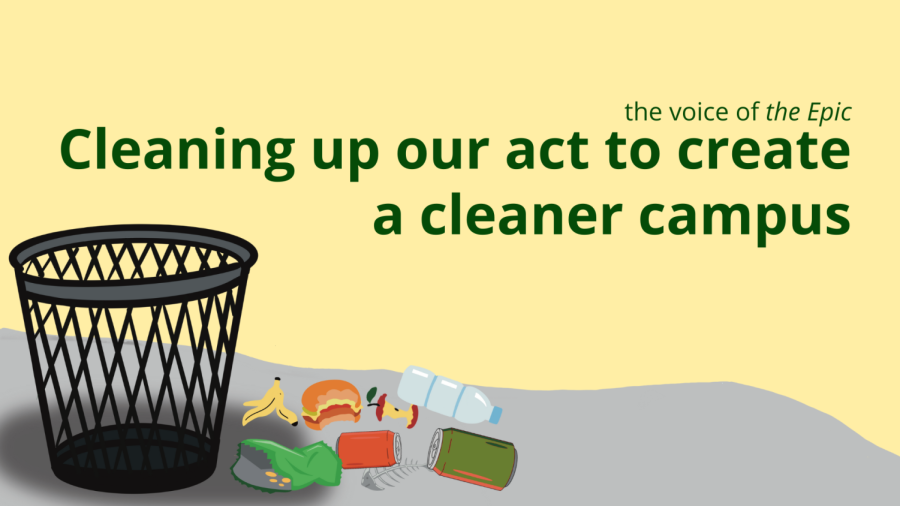Editorial: Cleaning up our act to create a cleaner campus
Graphic Illustration by Amishi Chandra, Lilly Wu and Inaaya Yousuf.
Trash such as leftover food and empty water bottles are often found on Lynbrook’s campus due to student negligence.
June 2, 2023
As the lunch bell rings, it’s hard to miss the trash left behind in the scramble to get to classes: disposable lunch trays, clamshell salad cartons and food wrappers litter the campus, often still filled with remnants of lunches. The gradual rise in similar instances of irresponsibility with trash and recycling across campus has raised concerns among members of the community who are left to contend with the consequences. These incidents stress a need for increased student accountability and awareness to help maintain cleanliness on campus.
Although there are many trash cans and recycling bins on campus, littering is still commonly seen in locations such as the quad and tables. Undisposed trash is typically minimal at the beginning of the year, but the quantity noticeably increases as the year progresses. To combat this issue, students should do their part in cleaning up and throwing away trash correctly.
“I’ve seen an entire uneaten pizza, multiple cartons of unopened milk, spilled salads and napkins everywhere,” junior Jaye Nagata said. “There has definitely been much more trash left around campus this year than last year.”
Littered food also attracts the attention of animals such as seagulls, who have grown accustomed to waiting for the end of meal times to eat from students’ leftovers. One example of efforts made by school staff to mitigate this problem was an Instagram post by school principal Maria Jackson’s account in January. Written on behalf of the custodial staff, it touched on the health risks associated with seagulls and requested that students be more considerate and take responsibility for keeping the campus clean. Still, the trash and littering issues persist.
“We definitely need help with picking up the garbage after brunch and lunch,” facilities manager Fulgencio Pelayo said. “Crows, squirrels and even mice can be seen on campus, scrounging for trash left out by students.”
Similarly, in recycling bins in classrooms and across campus, negligence in distinguishing between trash and recycling when disposing litter has affected the campus’s waste management as well as those responsible for it. For example, Training for Transition, a course taught by culinary arts and special education teacher Megan Miller, educates students on college and career readiness and allows them to get hands-on experience handling mixed recycling. In this class, groups of students help collect recycling from bins across campus every week, but often must dispose of litter and remove trash from recycling contaminated by other students.
“Putting trash in recycling bins creates needless work for whoever is collecting it,” Miller said. “While it’s not done with malicious intent, students should educate themselves about what can or cannot go in recycling bins to reduce unnecessary work for others. ”
People on campus such as Miller, Pelayo and those who assist them are inconvenienced by students’ negligence, causing them to spend time on issues that could be easily avoided at their origin by students taking simple steps. While school custodians are ultimately responsible for cleaning up the waste on campus, their difficulties are greatly amplified by the lack of student awareness and attempts to address these issues within the student body.
“I think encouraging each other to pick up trash goes a really long way, especially with Lynbrook students,” Assistant Principal Tara Grande said. “The biggest way to address the issue of littering is to get more student-to-student contact to raise awareness and enforce change.”
Lynbrook provides multiple methods for food preservation. For example, bins are placed near the condiments area of the cafeteria to allow students to place extra fruit for others to take if needed. Furthermore, hot food left from brunch and lunch are often donated in large quantities to the Peninsula Food Runners, an organization whose mission is to limit food waste and alleviate hunger by collecting excess food in San Mateo and Santa Clara counties. As the school continues in their efforts to limit food waste on campus, it is important for students to contribute as well.
“One of the values that we’re supposed to be imparting to students while they’re here is character and citizenship,” Jackson said. “It’s realizing you have the power and efficacy to change the world that you’re living in right now by taking care of our campus and realizing that what you do has a ripple effect on other people.”
the Epic voted 39 – 0 in favor of this stance with 1 abstaining.


































































